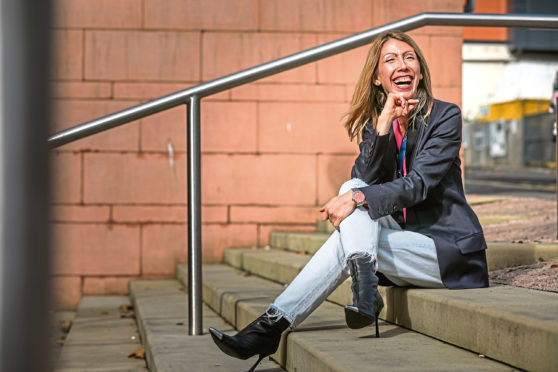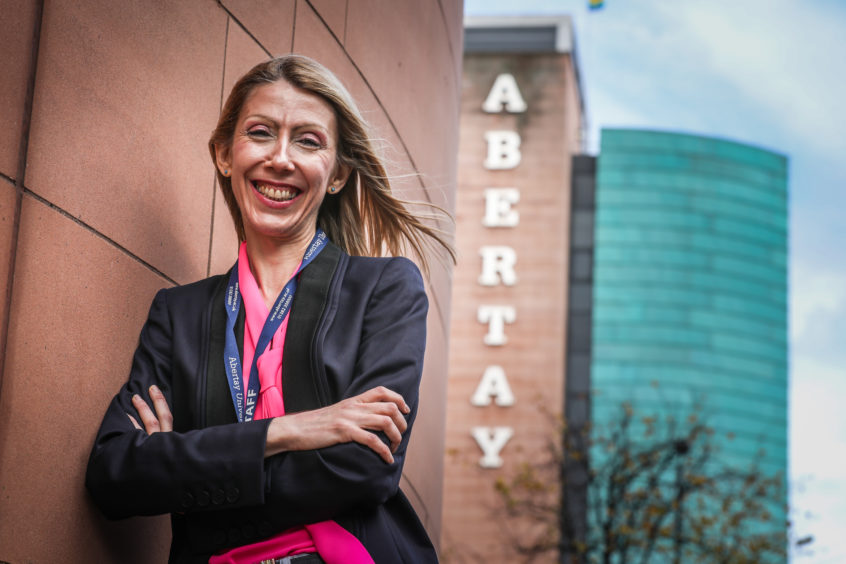Abertay University’s Dr Zoe Chouliara reshapes lives, working with victims of trauma and abuse to achieve recovery and growth.
She is considered one of the UK’s Top 100 Lifesavers, and a world expert on helping survivors of abuse.
The terms behind what she does may sound lofty, but her work gets to the important points. She is a person-centred practitioner and academic psychologist. She combines research with hands-on practice, taking in the big picture – financial adversity, social and cultural factors, environmental and political influences – and looking at the person caught up in it all.
This 45-year-old professor in mental health has been hailed as one of the youngest, most authentic female voices in person-centred psychology in the UK and internationally.
The 12-page booklet, Acts Of Recovery, of which she was lead author, is the first research-based, survivor-centred, self-help handbook for childhood abuse and is used in Australia, India and in the UK, where it’s endorsed by the Scottish Government, Survivor Scotland and the Scottish Recovery Network.
She’s also an amateur mezzo soprano with a heart the size of Texas, who listens to RnB to “work, walk and dance”.
To mark World Mental Health Day, Dr Chouliara (although you really want to call her Zoe) is giving a talk at Abertay University tonight, looking at how people can cope with, and even grow from, traumatic events, from domestic abuse to serious illness and organised violence (examples of this are war and torture). Abertay is expecting 300 people. Mental health is everyone’s business.
Zoe Chouliara describes herself as “bilingual”, speaking Greek and Scots. Born in the mountain town of Ioannina in north-west Greece, a regional town dating to medieval times, circled by lakes and mountains, she calls herself a “northerner” and a “highlander”.
She came to Scotland for post-graduate studies at Stirling University “half my life ago”, and stayed.
Gradually she absorbed Scottish humour, understood the dialects, became at home, and when she had her son, Aidan, seven years ago, “the whole of Scotland seemed to rush in to give him his Scottish identity”.
A shy child herself, she thinks she drifted into psychology because she was quiet, but also curious and empathetic “to a fault”.
“I developed the ability to relate to people,” she says.
“It’s a great joy, nothing can compare to it.”
While she achieved academic brilliance in the field of psychology, it didn’t give her the practical, hands-on skills of therapeutic psychology, so she studied that too. And then she brought the two disciplines together.
Acts Of Recovery was written when she was pregnant and suffering ghastly hyperemesis.
“We knew what abuse and trauma survivors were telling us,” she says, “and we had to find a way to bring their stories together.”
The sense of shame, she says, is a pervasive thread in abuse stories.
“It’s telling you there is something wrong with you, something rotten. It’s a big barrier to recovery, but it helps once you share your stories.”
Recovering is not an outcome, she adds. It’s a process for a lifetime. Sometimes you will go backwards; sometimes you are propelled forwards.
Dr Chouliara has seen people in “chronic physical conditions around the world”, she’s made a study of people’s response to cruelty and trauma, from domestic violence to torture. Simply put, she looks at what happens when people’s basic assumptions of trust, safety and intimacy are shattered.
She says we all have “the power to drive us to survival and beyond, to growth, which is the next phase”.
Today, she says, we may be living longer, but we live in a “traumatogenic” world. A world of conflict, financial adversity, political volatility, catastrophic weather events – and Scotland is not exempt. We’re staring down huge financial and political changes.
Depression co-exists with these factors and poverty in Scotland must be held accountable for poor mental health.
We have to address financial adversity, she says, and it is not acceptable to have 450 children without heating in a Highland winter, or the elderly having to choose between heating and eating.
Today’s Brexit uncertainty and political volatility will also take a toll. It’s hard to predict what the data will show, she says, but the divisions being created in our society, the uncertainty and the prospective financial consequences will have an impact on people’s future mental health.
But, she says, Scotland has taken some radical steps for a nation of just seven million people. She notes that our strategy to combat abuse, and child abuse, is unique in the world, as is our preventative strategy among youth – if you start with the youth, she says, you will reduce instances of abuse by 30%.
Her CV is formidable for both her accomplishments and the diversity of her expertise, as is her list of honours and achievements. This young, vibrant, outgoing professor is completely at odds with the “stereotypical” professor – for one thing, her shoes are so stylish they need their own citation.
They say in order to understand people, you need to know what motivates them. Dr Zoe Chouliara is motivated by people.
“People make me happy. Seeing them thrive.”
She also likes to sing (mezzo soprano) and dance, and she enjoys a good ceilidh, “even though I keep having to re-learn the steps”.
The secret, she says, is a diet of positive emotions. Don’t ignore the negative ones, but feed them a diet of positive feelings. It’s that simple.
Dr Zoe Chouliara is speaking in the Main Lecture Theatre, Abertay University, Bell St, at 6pm. The event is free, but please register via Eventbrite.











